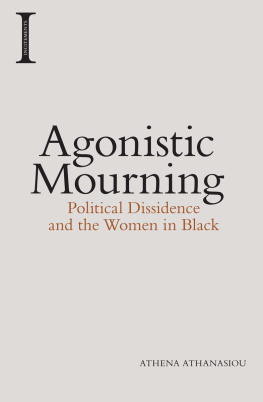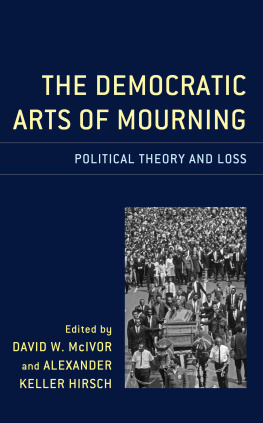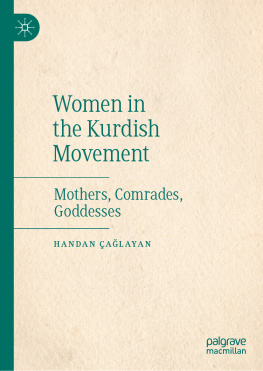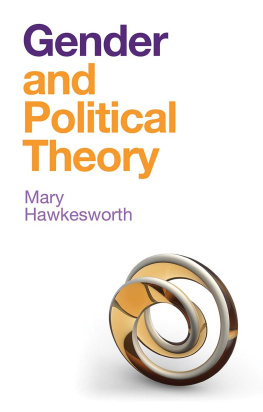Agonistic Mourning
Incitements
Series editors
Peg Birmingham, DePaul University
and Dimitris Vardoulakis, Western Sydney University
Editorial Advisory Board
tienne Balibar, Andrew Benjamin, Jay M. Bernstein, Rosi Braidotti, Wendy Brown, Judith Butler, Adriana Cavarero, Howard Caygill, Rebecca Comay, Joan Copjec, Simon Critchley, Costas Douzinas, Peter Fenves, Christopher Fynsk, Moira Gatens, Gregg Lambert, Leonard Lawlor, Genevieve Lloyd, Catherine Malabou, James Martel, Christoph Menke, Warren Montag, Michael Naas, Antonio Negri, Kelly Oliver, Paul Patton, Anson Rabinbach, Gerhard Richter, Martin Saar, Miguel Vatter, Gianni Vattimo, Santiago Zabala
Available
Return Statements: The Return of Religion in Contemporary Philosophy
Gregg Lambert
The Refusal of Politics
Laurent Dubreuil, translated by Cory Browning
Plastic Sovereignties: Agamben and the Politics of Aesthetics
Arne De Boever
From Violence to Speaking Out:
Apocalypse and Expression in Foucault, Derrida and Deleuze
Leonard Lawlor
Agonistic Mourning: Political Dissidence and the Women in Black
Athena Athanasiou
Interpassivity: The Aesthetics of Delegated Enjoyment
Robert Pfaller
Derridas Secret: Perjury, Testimony, Oath
Charles Barbour
Resistance and Psychoanalysis: Impossible Divisions
Simon Morgan Wortham
Visit the series web page at: edinburghuniversitypress.com/series/incite
Agonistic Mourning
Political Dissidence and the Women in Black
Athena Athanasiou

Edinburgh University Press is one of the leading university presses in the UK. We publish academic books and journals in our selected subject areas across the humanities and social sciences, combining cutting-edge scholarship with high editorial and production values to produce academic works of lasting importance. For more information visit our website: edinburghuniversitypress.com
Athena Athanasiou, 2017
Edinburgh University Press Ltd
The Tun - Holyrood Road, 12(2f) Jacksons Entry, Edinburgh EH8 8PJ
A CIP record for this book is available from the British Library
ISBN 978 1 4744 2017 4
The right of Athena Athanasiou to be identified as the author of this work has been asserted in accordance with the Copyright, Designs and Patents Act 1988, and the Copyright and Related Rights Regulations 2003 (SI No. 2498).
Contents
Acknowledgements
As this book is the outcome of a protracted and meandering course, I have accrued, to be sure, several deep-seated debts over the past few years. Much as the figure of debt inevitably retains an uncanny resonance with the abusive economy of financialisation, the dominant grand narrative of our time, having the opportunity to reaffirm my abiding indebtedness here is an incommensurable pleasure and responsibility beyond the order of debt. Although it is arguably impossible to recount, reckon, and do justice to all of them, in their singularity, this book would not have been possible without the kindness, wit, insight, and accompaniment of many people who have helped me see it through to its completion; who were there at many key moments and provided timely comfort and inspiration along the way. I owe them the incalculable reliance on what exceeds the proper apparatuses of debt.
Above all, I wish to thank all uC Women in Black activists who graced me with their trust and shared their stories with me during my time in Serbia. I would never have been able to carry out this research project without their courage, commitment, hospitality, and comradeship. They deserve more acknowledgement and gratitude than I can possibly offer them here. I want to specifically thank Bojan Aleksov, ore Balzamovi (ole), Hana opi, Daa Duhaek, Naia Duhaek, Ildiko Erdei, Fika Filipovi, Senka Kneevi, Saa Kovaevi, Nataa Lambi, Goran Lazin, Zinaida Marjanovi, Jadranka Milievi, Lepa Mlaenovi, Dragan Proti (Prota), Ljiljana Radovanovi, Slavica Stojanovi, Bari Tabaki, Milo Uroevi, Marija Vidi, Adriana Zaharijevi, and Staa Zajovi. They all never tired of letting me know that their collective and dissident mal darchive was all worth it. I thank them for consistently teaching me anew the performative and profoundly transformative scope of responsiveness. This politics of responsiveness, imbued as it is with collective stories of contrapuntal displacement and resistance to border violence, sets the stage for the pages to follow. And although comparisons should be drawn only in the most cautious way, it is precisely this call for responsiveness to war, loss, refugee, and asylum rights that has been acutely recurring in these times of necropolitics at the borderscapes of a fortress Europe, increasingly overtaken by nationalism, authoritarianism, and deepening economic inequalities. Indeed, as Adorno put it in his 1959 text The meaning of working through the past: Nationalism today is at once both obsolete and up-to-date (Adorno 2005).
I am grateful to Staa Zajovi who supported this work by her way of re-inscribing resistance in a singular plural experience of ex-position: singularity inextricably interconnected to plurality. I am particularly thankful for the unwavering camaraderie and disarming generosity of Saa Kovaevi also exquisite language instructor, beyond the purview of translation. I am most appreciative of the insight and vision of Rada Drezgdi, Daa Duhaek, Ildiko Erdei, Orli Fridman, Obrad Savi, Slavica Stojanovi, and Adriana Zaharijevi. Special thanks to Adriana Zaharijevi for reading parts of the manuscript with delicate attention. Photographers Vesna Pavlovi and Srdjan Veljovi have my sincere appreciation for kindly allowing me to use their photographs. I am grateful to Petar Bojani, director of the Institute for Philosophy and Social Theory at the University of Belgrade, for offering me institutional hospitality in Serbia during the course of my research. The assistance of Jelena Vasiljevi was gracious and much appreciated. Theodora Vetta deserves mention as well for her generosity in sharing anthropological knowledge and inventive advice in practical matters of everyday life while in Belgrade.
Heartfelt thanks go to Penelope Papailias, brilliant friend and interlocutor, for reading, commenting, and brainstorming substantively and patiently with me over the course of fashioning and refashioning my thoughts; she read the manuscript and gave generously of her time to contribute detailed feedback, editorial insight, and rigorous advice. Another dear friend, Olga Taxidou, not only read particular chapter drafts with acumen, but she has been a long time, essential, and solicitous interlocutor throughout writing: I am most grateful for her multi-layered, poetic, and theatrical readings of my work but also for her advice and encouragement when uncertainty erupted. I also thank the anonymous Press readers for their incisive and prescient comments, which were enormously helpful as I revised. The faults that have remained are my own.
My indebtedness to Judith Butler is immeasurable. Her work over the years has engaged and prompted my thinking in many thorough ways, as this book shows. She offered an extraordinarily close reading and characteristically astute comments, which strengthened the book. I cannot thank her enough for the gift of that resonant response but also for sustaining my work with her luminous intellectual engagement. I have been consistently moved and motivated by her keen insight and emotional generosity.












